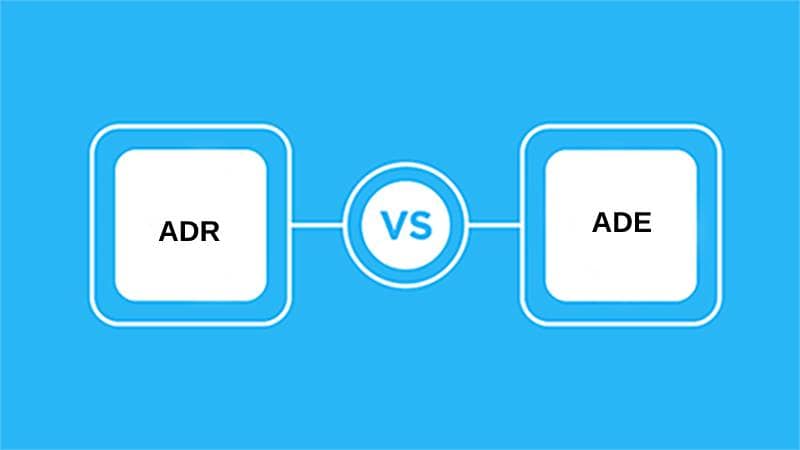In the field of medical science, several drugs are formulated every day. Mankind has advanced very much in the field of medicine and can now prevent and fight diseases that once were so fatal that death was unavoidable. Yet the formulation of these drugs brought about new threats that arise from their side effects, negligence in their consumption, and accidents in prescribing them.
Most of the time, these mishaps are avoidable and can be prevented by taking precautionary measures, but not all are very serious or life-threatening. These can be divided into broadly two types: Adverse Drug Reaction (ADR) and Adverse Drug Event (ADE).
ADR vs ADE
The main difference between an Adverse Drug Reaction and an Adverse Drug Event is that an Adverse Drug Reaction refers to the side effects or allergic reaction from consuming a drug or medicine. In contrast, Adverse Drug Event refers to the effects that occur from the inappropriate use of the drug.

Adverse Drug Reactions are common, known effects that happen from drug consumption and are informed by the medical practitioners themselves. In contrast, Adverse Drug Effects are the effects of wrong medication that is either excessive or inadequate.
Comparison Table Between ADR and ADE
| Parameters of Comparison | ADR | ADE |
| Definition | These are effects of drugs that are noxious but occur normally in the usage of the drug and are in most cases known. | These are the effects that take place from error in prescription, insufficient or overdose or altogether discontinuation of the drug. |
| Triggers | This occurs as a side effect of the drugs. | This occurs in error in the consumption of the drug. |
| Prevention | It cannot be prevented. | It can be prevented. |
| Errors in medication | This does not happen in error in medication. | This happens in the error in the medication and the dosage consumed. |
| Allergic reactions and Side Effects | These are the allergic reactions or side effects of the drug that are not normally fatal and can resolve by themselves. | These are not allergic reactions rather is a form of mishap and a medical practitioner should be consulted. |
| Examples | Can normally involve skin allergy to laxative effects. | Overdose of sleeping pills can result in heart stroke and other risks. |
What is ADR?
An Adverse Drug Reaction is a reaction that happens in response to the normal dosage of a drug consumed for diagnosis or therapy. They may occur following a single dosage of the drug, a prolonged dosage, or as a result of two or more drugs being consumed together.
They refer to the injury that occurs when the drug is consumed. Unlike ADE, they are the only harm that occurs in the correct dosage of the drug, unlike ADE, which can occur due to omitting the dosage of drugs.
The most common ADRs are skin allergy, drowsiness, nausea, diarrhea, fatigue, vomiting, or even laxative effects in certain medications. Adverse Drug Reactions are not that threatening and are informed by the practitioner while prescribing, as in the case of antidepressants that arouse drowsiness.
What is ADE?
An Adverse Drug event can be defined as an injury resulting from errors in the consumption of medicine, ranging from errors in the prescription of the drug, omitting it, overdose, or reduction of the dose. While these may be common instances of ADE, certain cases arise in the improper or negligent production of drugs where the drugs are not produced correctly and approved without proper testing. Certain medicines like morphine, insulins, medicines related to cardiac issues, etc.
It is important to note that people of the elderly are more vulnerable to ADE than others. Further, ADE is among the highest reported cases of emergency worldwide. And up to 50% of them are preventable, as most of them are caused by either negligence or cases of self-medication. They can broadly be characterized into Potential ADE that is predicted to occur or Ameliorable ADE that, if not preventable, could have been controlled to avoid severe casualties.
Therefore, one of the best ways to avoid ADE is to keep a list of prescribed medications. In addition, the past condition of the patient should also be highlighted to the practitioners while prescribing medications.
Main Differences Between ADR and ADE
- ADRs are known effects of drugs that happen in the normal dosage and are informed by the medical practitioner. In contrast, ADEs happen from errors in prescription, insufficient, overdose, or altogether discontinuation of the drugs.
- ADR occurs as a side effect of the drugs, while ADE occurs in error in the consumption of the drug.
- ADRs are non-preventable, while ADEs are preventable in most cases.
- ADRs do not happen due to medication errors, while ADEs result from errors or negligence in medication.
- ADRs are allergic reactions or side effects and normally are not fatal, contrary to it, these are rather forms of mishaps and require immediate consultation of the medical practitioners in most cases.
- ADRs can vary from skin allergy to laxative effects, while ADE instances include a heart stroke from a sleeping pill overdose.
Conclusion
Often confused to be the same, ADRs are the effects of the drug that occur during the treatment process and, in most cases, are explained in the prescription of the drug. At the same time, ADE occurs due to errors in the consumption of the Drug. ADRs are predictable but non-preventable, but ADEs are caused due to the patient’s personal experience with the drugs and thus can be prevented by avoiding errors in drug consumption.
It is, therefore, important for the patients to inform the medical practitioner of their past condition and also for the practitioner to inquire about the same. These are important medical injuries caused by drugs; therefore, they should be dealt with concern to avoid fatal consequences.